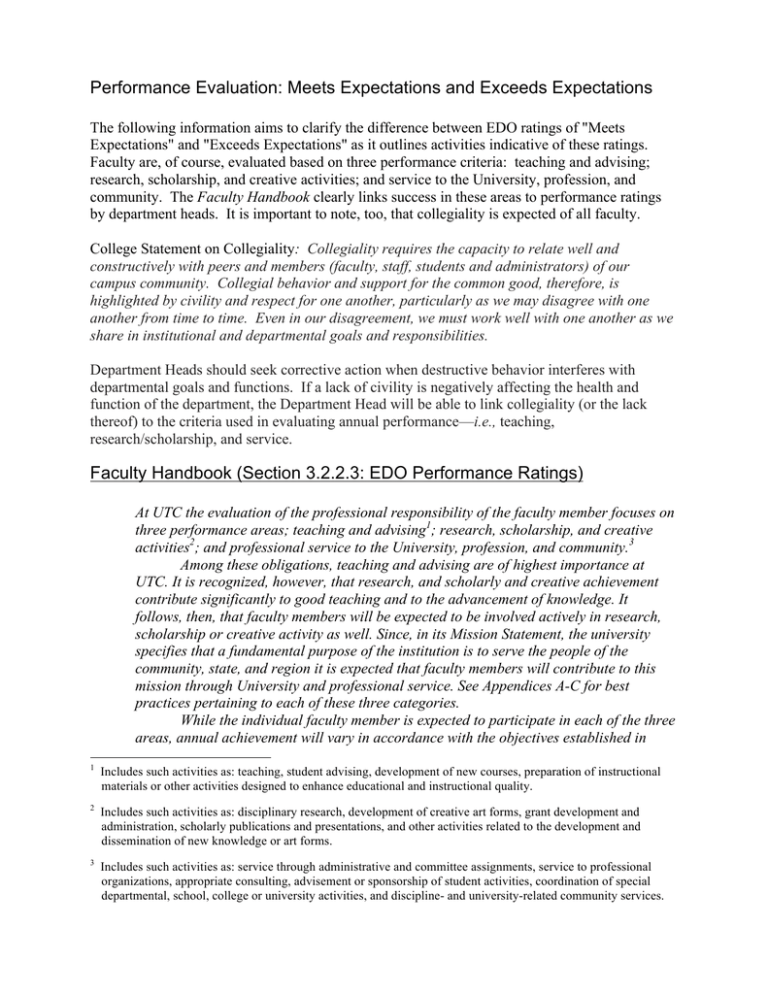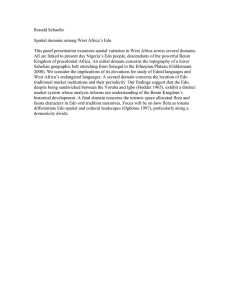Performance Evaluation: Meets Expectations and Exceeds
advertisement

Performance Evaluation: Meets Expectations and Exceeds Expectations The following information aims to clarify the difference between EDO ratings of "Meets Expectations" and "Exceeds Expectations" as it outlines activities indicative of these ratings. Faculty are, of course, evaluated based on three performance criteria: teaching and advising; research, scholarship, and creative activities; and service to the University, profession, and community. The Faculty Handbook clearly links success in these areas to performance ratings by department heads. It is important to note, too, that collegiality is expected of all faculty. College Statement on Collegiality: Collegiality requires the capacity to relate well and constructively with peers and members (faculty, staff, students and administrators) of our campus community. Collegial behavior and support for the common good, therefore, is highlighted by civility and respect for one another, particularly as we may disagree with one another from time to time. Even in our disagreement, we must work well with one another as we share in institutional and departmental goals and responsibilities. Department Heads should seek corrective action when destructive behavior interferes with departmental goals and functions. If a lack of civility is negatively affecting the health and function of the department, the Department Head will be able to link collegiality (or the lack thereof) to the criteria used in evaluating annual performance—i.e., teaching, research/scholarship, and service. Faculty Handbook (Section 3.2.2.3: EDO Performance Ratings) At UTC the evaluation of the professional responsibility of the faculty member focuses on three performance areas; teaching and advising1; research, scholarship, and creative activities2; and professional service to the University, profession, and community.3 Among these obligations, teaching and advising are of highest importance at UTC. It is recognized, however, that research, and scholarly and creative achievement contribute significantly to good teaching and to the advancement of knowledge. It follows, then, that faculty members will be expected to be involved actively in research, scholarship or creative activity as well. Since, in its Mission Statement, the university specifies that a fundamental purpose of the institution is to serve the people of the community, state, and region it is expected that faculty members will contribute to this mission through University and professional service. See Appendices A-C for best practices pertaining to each of these three categories. While the individual faculty member is expected to participate in each of the three areas, annual achievement will vary in accordance with the objectives established in 1 Includes such activities as: teaching, student advising, development of new courses, preparation of instructional materials or other activities designed to enhance educational and instructional quality. 2 Includes such activities as: disciplinary research, development of creative art forms, grant development and administration, scholarly publications and presentations, and other activities related to the development and dissemination of new knowledge or art forms. 3 Includes such activities as: service through administrative and committee assignments, service to professional organizations, appropriate consulting, advisement or sponsorship of student activities, coordination of special departmental, school, college or university activities, and discipline- and university-related community services. 2 conference with the academic department head. Lesser participation in one area should be counterbalanced by greater participation in others. In the three areas of responsibility4 (teaching, research, and service), the academic department head will evaluate the faculty member’s routine responsibilities established by the academic department, those defined in the Faculty Handbook chapter entitled "Faculty Responsibilities," and those identified on the Individual Objectives Sheet for the period being evaluated. EDO Rating: Meets Expectations vs. Exceeds Expectations College Guidelines for Standard and Exceptional Performance: The following are representative activities of the faculty, though not exhaustive, for the areas of: teaching and advising; research, scholarship, and creative activity; and service. Faculty are responsible for documenting specific activities and outcomes in each area. Department Heads are responsible for assessing performance in these areas. In doing so, Department Heads should think of faculty performance in terms of quality, scope, and impact. (For example, in the area of scholarship, refereed publications and monographs published with university presses should carry more weight than nonrefereed publications.) Similarly, Department Heads should be mindful that faculty performance is evaluated based on 1. appropriate objectives for the academic year, specifically objectives set by the faculty member and approved by the Department Head,5 and 2. a comparison with the performance of peers within the same department/program. With the latter point in mind, it is unreasonable to expect that ALL faculty in a single department or program may be nominated for the performance rating of "Exceeds Expectations." Department Heads, therefore, must be judicious in making such recommendations ("Exceeds Expectations") to the Dean. Likewise, the Dean will require that such recommendations be ranked. Finally, despite the fact that a faculty member may "counterbalance" a weaker area with strong performance in another area for the performance rating of "Meets Expectations," failure to meet expectations in any single area shall exclude a faculty member from being considered for the performance rating of "Exceeds Expectations." 4 Faculty on sabbatical or other special assignment (e.g. educational leave, research leave) may not be active in each of the three areas during this assignment. With prior agreement, these faculty will be evaluated and, depending on performance, be eligible for a merit salary increment. In accordance with the Faculty Handbook statement, "leaves of absence are normally granted for no more than one year and are normally without university compensation." Faculty on non-academic leave without pay will not normally be evaluated, nor will they normally be eligible for merit salary increment for the year on leave. 5 Faculty Handbook, Section 3.2.2.1, Establishing Objectives: Since the objectives of the faculty are fundamental components of the EDO process, it is important that they be carefully prepared. It is the responsibility of the faculty member to clearly articulate specific objectives and to demonstrate how these relate to his or her professional development and responsibilities. It is the responsibility of the academic department head to provide an unambiguous review of the merit and quality of these objectives within the context of the disciplinary standards for the profession and the expectations of the faculty member specified in the letter of appointment. 3 EDO Activities: Meets Expectations vs. Exceeds Expectations Teaching and Advisement Instructors, Lecturers, and Professorial Ranks: All faculty, regardless of rank or status (part time or full time), are expected to demonstrate commitment to good teaching, and they are expected to provide quality instruction in all courses. Unlike the other categories for performance evaluation, the category of teaching and advising carries basic responsibilities. Select teaching materials which are appropriate to the course description Select teaching materials that reflect current developments in the discipline or field Submit orders for course materials (i.e., books, textbooks) upon request Prepare and submit upon request syllabi that follow UTC guidelines Specify in the syllabus a set of reasonable grading practices and follow them carefully Teach courses in accordance with the syllabus Meet classes as scheduled or, if it is necessary to be absent, notify the Department Head Hold office hours and be available to meet with students outside of regular class hours Demonstrate satisfactory teaching that encompasses and is informed by student & peer evaluation Submit midterm and final grades on time Share in the responsibility for advising students, according to departmental arrangements for advisement Write letters of recommendation when appropriate Representative Activities for Exceptional EDO Rating Prepare new and innovative course materials Direct Departmental Honors Project(s) Direct student research project(s), independent studies or directed studies Prepare advising materials Participate in professional development activity Receive teaching and/or advising award Attain superior student and/or peer evaluations Research, Scholarship and Creative Activities Instructors and Lecturers: There are no research requirements for faculty appointed at the rank of Instructor or Lecturer. However, published or presented research, scholarship, and creative activity should be considered when present in performance evaluation. Occasionally, Instructors will have a contract that specifies that continuation of their appointment is dependent on the completion of the terminal degree. Professorial Ranks: All faculty who hold the ranks of Assistant Professor, Associate Professor, or Professor are expected to maintain a program of scholarly engagement in their discipline. Specific expectations for each faculty member are to be developed annually in consultation with the Department Head and included in the statement of EDO objectives. (Faculty should consult “Criteria for Tenure” in the Faculty Handbook for cumulative 4 standards of evaluation.) Whether or not a particular activity meets or exceeds expectations depends on the quality, scope, and impact of the work. Representative Activities for Standard EDO Rating Engage in research, scholarship, or creative activity Prepare/submit book review for publication Prepare/submit article or creative work for publication Participate or perform in juried exhibition Attend a professional conference Organize/lead a professional workshop Present paper at professional meeting (regional, national, international) Submit proposal to outside funding agency Representative Activities for Exceptional EDO Rating Publish article Author or edit a book, collection, journal, or reference work Present paper at professional meeting (regional, national, international) Receive national/international recognition Develop and/or coordinate professional seminars, workshops, etc. Present/Perform invited work, exhibition, seminar, or lecture Organize, chair session, or serve as discussant at professional meeting Receive awarded grant Administer a funded research grant Service to the University, Profession, and Community Instructors and Lecturers: Faculty appointed at the rank of Lecturer are expected to provide departmental and university service through committee assignments or less formal arrangements developed in consultation with the Department Head and specified in the statement of EDO objectives. Professorial Ranks: Faculty appointed at the professorial ranks are expected to provide departmental and university service through committee assignments or less formal arrangements developed in consultation with the Department Head and specified in the statement of EDO objectives. They are likewise expected to engage in community and professional service activities as may be appropriate to the discipline. Representative Activities for Standard EDO Rating Attend commencement Attend university and college-wide faculty meetings Maintain active membership in professional organization(s) Organize/chair a professional workshop or conference panel Participate in student recruitment, e.g., Fall Visitation Day, meet w/ prospective students Participate in retention activities, e.g., First Year Reading Experience activities, "First Class" meetings, Freshman Academic Success Tracking (FAST) program, etc. 5 Participate in departmental activities, e.g., faculty meetings; awards banquets; alumni receptions Respond in a timely manner to queries from the public or community Review grant proposals for campus or regional funding agencies Support and assist colleagues Serve on departmental committee(s) Serve on university committee(s) Representative Activities for Exceptional EDO Rating Marshal or otherwise participate in commencement Chair time-intensive, departmental or university committee Coordinate student recruitment activities Engage in special service to department or university, e.g., SACS review process, Strategic Planning Organize a professional conference (regional or national) Provide ongoing service to local schools/community Provide professional consulting services Review manuscript(s) for a journal or press Review grant proposal(s) for a major funding agency, e.g., NSF, NEH, etc. Serve as officer in professional national or international organization Serve on committee of professional national or international organization Serve on Faculty Senate or other time-intensive university committees Approved and adopted by A&S Department Heads on February 5, 2014
